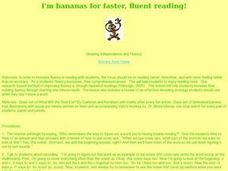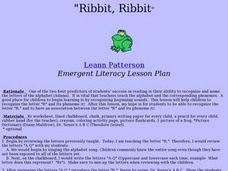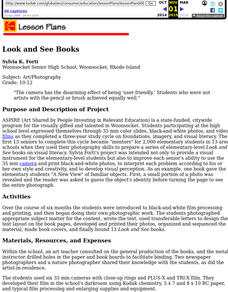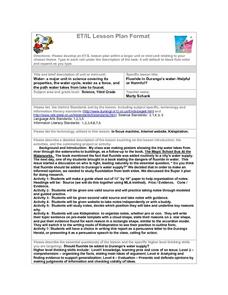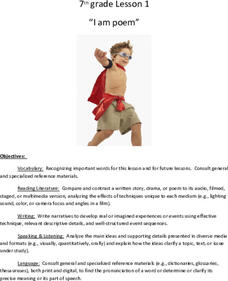Curated OER
Developing a Media Portfolio
students discuss the vehicles used by media to feed images to consumers. In small groups, 9th graders are given magazines and asked to pick out the ads that appeal to them. They write responses to the questions:
Curated OER
Mrs. Moore's Question
Fifth graders answer a fictitious question asked by their school principal. After reading the question together, they write an appropriate response and show her what they have gathered about the circulatory system. They type their letter...
Curated OER
I'm Bananas for Faster, Fluent Reading!
Young scholars review the way to use cover-ups to focus on vowels and decoding. They listen as the teacher demonstrates reading a sentence slowly like a robot, and then a little faster each time, adding feeling and expression. They then...
Curated OER
Sammy the Slimy Snake
Students engage in a emergent literacy lesson with the intention of improving reading comprehension. The goals of the lesson include recognizing both upper and lower case S, to create an awareness of the mouth movement and the phoneme...
Curated OER
Word Adaptation
Seventh graders differentiate evolution and adaptation. In this biology lesson, 7th graders make new words from a given word by adding or changing a letter. They set up a T-chart and enumerate how adaptation is like or unlike evolution.
Curated OER
I Feel the Need....The Need for Speed!
Students first learn to decode when learning to read. Decoding each letter and phoneme in a sentence or even a short text takes a considerable amount of time. Students must drill to progress in the pace and level of their reading. In...
Curated OER
Introduce Contractions
Students are introduced to contractions and their function as apostrophes. In this contraction lesson, students recall the word "it's" on the board. Students then sound out the word and recognize that he apostrophe is silent. Students...
Curated OER
The Window
Students read a story entitled, "The Window," and discover how some cultures are rejected by others. Students write a letter expressing feelings of rejection and keep a journal of significant events in the story. Using a graphic...
Curated OER
Ribbit! Ribbit!
Learners research a frog's life cycle and habitat using books, the Internet and lecture. Students make origami frogs, write letters to Toad from Arnold Lobel's "Frog and Toad" and participate in a simulated camouflage activity.
Curated OER
Social Studies: Native american Tribal Sovereignty
Pupils examine the issue of tribal sovereignty for Native Americans. Following a mock trial simulation based on the case of Johnson v. McIntosh, they write opinion papers based on the results of the Supreme Court decision in 1823.
Curated OER
Charlotte's Web
Young scholars compare the differences in insects and spiders and design a worksheet that teaches the differences. Students record on chart
organizing the information about the pet, its food, habitat, exercise, and other ways to care...
Curated OER
Look and See Books
Students photograph appropriate subject matter for the content, write the text, use transferable letters to design their very own book.
Curated OER
The Big Lie
Fifth graders create poems and other forms of writing.Then working in groups they share writing with each other. The opinions would be gathered and students would revise writing according to the comments.
Curated OER
Mirror, Mirror on the Wall, Who Needs Math in Life at All?
Learners think and talk about the ways in which they use math throughout the day. They add each way to a "math in real life" bulletin board and reflect in writing on the ways they use math.
Curated OER
Reading a Graph: Azimuth Range vs. Day in Barrow Alaska
Young scholars practice reading a graph while doing story problems. They determine the x and y intercepts and calculate the slope. They also practice writing linear equations.
Curated OER
Book Of Vowels - Long and Short Vowel Sounds
Students study letters. For this vowel sounds lesson, students distinguish between long and short vowels. They work independently to make a book of the two types of vowels.
Curated OER
Fluoride in Durango's Water-Helpful or Harmful?
Third graders complete several activities in their quest to find out about the addition of fluoride to city water. First, they create a guide sheet to help organize notes. The next two steps involve taking notes through guided practice....
Curated OER
Learning to Read With Superman Speed
Students practice techniques to become more fluent readers by reading more proficiently and with faster speed. They stress mastery of the d=/d/, e=/e/ and de=/de/ sounds in spoken and written words. The book, "John Henry," by Julius...
Curated OER
Learning to Interview
Second graders watch simulated interview between the teacher and a student before they interview a classmate using the form provided. Next, they complete two interviews of family members at home. They focus on the concepts of ancestors...
Curated OER
I'm A Poet and Now I Know It
Eighth graders gather ideas generated from other poems and their own inspiration, to create original poetry. A celebration is included as students bind and submit poems for publication.
Curated OER
- Making Metaphors with Munchies
Students brainstorm independently first, then ask their best friend on the team, or seat partners, depending on the year & student mix, to add to their list of personal characteristics and/or to name three words they think of...
Utah Education Network (UEN)
7th Grade Poetry: I Am Poem
A study of Alfred Noyes's poem "The Highwayman" opens a lesson about narrative poetry. Scholars read the poem and compare it to the animated video version using a worksheet. Learners look at models and use a template to craft an "I Am"...
Curated OER
Learning to Interview
Second graders view and discuss a modeled interview presented in class. They interview their families and gather data that is later compiled and analyzed as a class.
Curated OER
Ask Me!
Help your class share what they have learned in their physical education class using this resource. Learners complete a homework activity in which they perform a skill to help their parents understand what they have been learning in...




